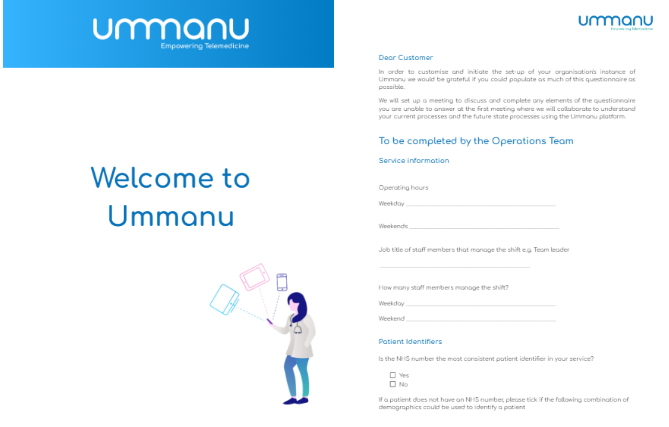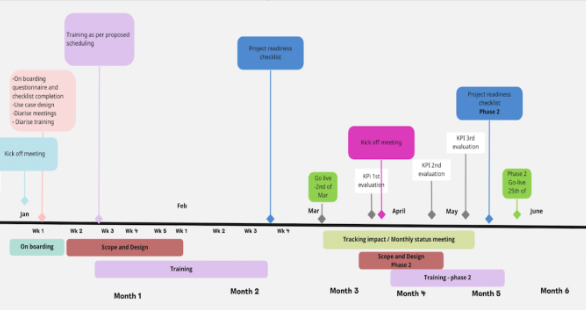To support effective and efficient implementation, we developed a framework to ensure success within a solid timeframe.
Adopting and integrating a software platform into a healthcare setting can be a costly, complex and time-consuming experience, which risks failing to deliver on promised impacts.
Our experience, implementing the system into more than 25 different clinical specialties, has proved that this does not have to be the case.
We believe that collaborating closely with an organisation to develop a customised implementation plan can ensure successful implementation and allow the benefits in efficiency, productivity and safety to be fully realised and for the value of the Ummanu system to be maximised.
Our first step in developing an implementation framework is the completion of an onboarding questionnaire and templates by the client team. This allows Ummanu to customise and initiate the set-up of the system.
The questionnaire is wide-ranging and detailed — a client’s operations team will be asked to complete sections on service information, patient workflow, clinician workflow and operator workflow describing the current service for example. It will also require detailed input from the IT or digital team.
The aim is to ensure the Ummanu implementation team have a thorough understanding of the current processes and can identify barriers and facilitators and know what is required to ensure the Ummanu solution works with the client’s existing systems for maximum effect.
There will also be questions on the approach an organisation has towards training, this will allow Ummanu to develop a detailed plan to roll out phased training for all the necessary staff — shift managers and team leaders, as well as the clinicians and admin staff (call handlers and dispatchers).
The training will ensure the staff are familiar with the features and functions of the platform and able to work in the most productive way. There will also be a requirement for training of dedicated IT support who will be responsible for supporting the clinicians (ensuring that the microphones work etc.) and the main IT staff who will be providing Tier 1 support internally. This staged training plan will involve videos and group sessions via online meetings.
There will be an agreed timeline to complete the questionnaire and these templates and all subsequent meetings and training sessions will be agreed at this initial stage and added to the diary to ensure that timelines are adhered to.
Subsequent meetings will focus on use case design — allowing Ummanu to elicit an in-depth understanding of the client’s workflows in order to support the customising and configuration of the Ummanu platform — and agreeing KPIs and reporting. The final status meeting will agree baselines data, feedback approach and update on the training deployment.
The Ummanu system is designed to be very flexible, which means that once the specific processes have been agreed it’s very easy for the team to quickly adjust and reconfigure the system if necessary.
These are the practical steps, but we believe there are several wider factors that ensure a good implementation.
Implementing any new technology may present challenges and it is key to ensure the engagement of the staff in the ownership of the new platform.
We have found it crucial to have the backing and engagement of senior stakeholders with a single point of ownership from the start of an implementation, in order to clearly set direction and to help reinforce the importance of the project in delivering on the organisation’s goals. The degree of ownership and the commitment of these stakeholders is an important factor influencing the outcome.
Ummanu’s dedicated implementation team is also led by senior team members including: Shlomi Yael, Vice President of Operations. His remit is to ensure the client is fully supported, to offer a direct line of communication for their staff to ask questions and to ensure a quick turnaround on any issues that might arise.
“Ummanu as an IT partner has been different to the other people we’ve worked with. From the start they were open, transparent, and honest. They’re massively competent. They’ve been there 24 hours a day and compared with other technology companies they’re just absolutely the bee’s knees.”
Dr Fay Wilson, Medical Director at Birmingham and District General Practitioner Emergency Room Ltd (Badger)
Clear communication, starting early in the process and cascaded throughout an organisation, can also help to involve staff and goes a long way to ensure buy-in by addressing any questions or reservations and clearly explaining objectives and benefits for the organisation. To ensure the cultural shift required for successful implementation takes place, the Ummanu team work with the client to design and deliver the right mix and content for both internal and external communications.
Itzik Levy, CEO of Ummanu, said: “We strongly believe that a well-designed implementation plan is important to ensure success. Our team works closely with clients to ensure that the behavioural, technical and organisational components of their healthcare setting are considered when developing the plan, but we’ve found it’s important that both partners are adaptable, responsive and retain the ability to flex — something that is key to helping address any barriers that may crop up during implementation.”
Of course, implementation does not stop with go-live, Ummanu also has a programme of ongoing monitoring and evaluation ensuring we can adapt the solution as and when required to ensure the benefits are being realised and intended goals are being met.
If you are interested in finding out more about our implementation process or would like to discover how our enterprise platform can help you, please email us at contact@ummanu.health.



